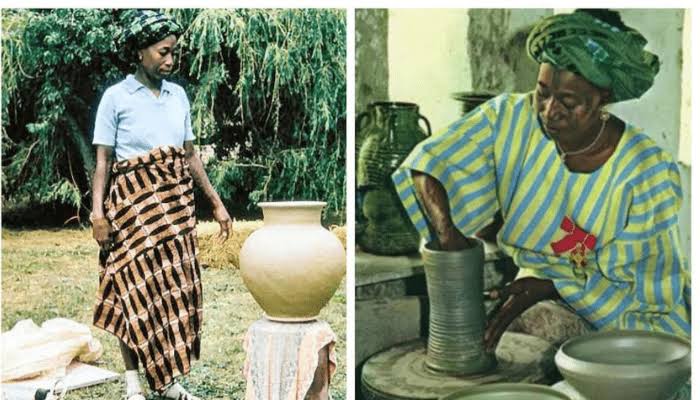Ladi Kwali is a name that shines brightly in the world of African art and pottery. Born in 1925 in Nigeria, Kwali became a celebrated potter whose work has made a lasting impact on the art world. Her beautiful and unique pottery has earned her a place in history as one of Africa’s most important artisans.
Ladi Kwali grew up in a village where pottery was a traditional craft passed down through generations. From a young age, she learned the techniques of pottery from her family and community. Her early exposure to this art form helped her develop a deep passion and skill for creating beautiful clay pots and other pottery pieces.
Kwali’s work was deeply influenced by the traditional methods and designs of her community. She used local clay and created pottery that was not only functional but also richly decorated with intricate patterns and designs. Her work reflected the culture and traditions of her people, and she became known for her distinctive style.
In the 1950s, Ladi Kwali’s pottery gained recognition beyond her local community. Her work was featured in exhibitions and art shows, where it caught the attention of art collectors and enthusiasts. One of the pivotal moments in her career came when she was invited to showcase her work at the National Museum in Lagos, Nigeria.
Her unique style and craftsmanship were celebrated, and she soon became a prominent figure in the art world. Kwali’s work was not only admired for its beauty but also for its representation of Nigerian culture and heritage. Her pottery was seen as a bridge between traditional African art and the modern art world.
Ladi Kwali’s influence extended far beyond her own creations. She was a mentor to many young potters and played a key role in preserving and promoting the art of pottery in Nigeria. Her dedication to her craft and her contributions to the art community inspired others to appreciate and continue the tradition of African pottery.
In recognition of her achievements, Ladi Kwali received numerous accolades and honors. Her work is now part of many important art collections and museums, and she is remembered as a trailblazer in African art.
Ladi Kwali passed away in 1984, but her legacy lives on. Her pottery continues to be celebrated for its beauty and cultural significance. Kwali’s contributions to the art world have helped to bring African pottery to a global audience, and her work remains a symbol of the rich artistic traditions of Nigeria.
Through her art, Ladi Kwali has left a lasting impression on the world, showcasing the richness of African culture and the skill of its artisans. Her story is a testament to the power of art to connect people and preserve traditions for future generations.











